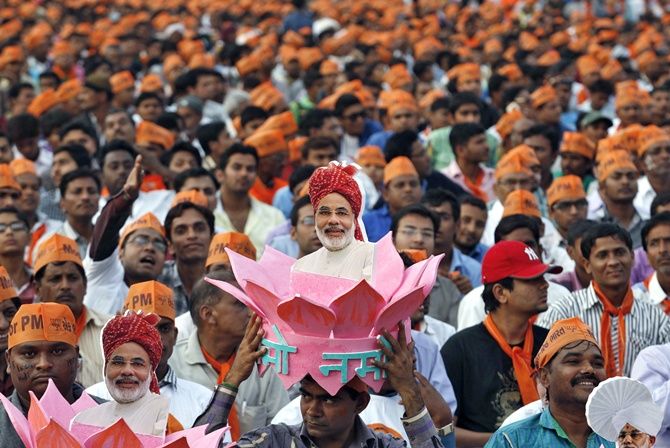The simple truth that Modi must explain is this: The days of 365-days-a-year, eight-hours-a-day employment are pretty much over, especially as an attractive political promise, says
T C A Srinivasa-Raghavan.

Most Indians are agreed on one thing: If Narendra Modi wants to be re-elected, he must create more jobs that provide a regular monthly income with benefits.
But assuming there is indeed a correlation between new jobs and re-election - and there is no evidence of this - no one is quite sure just how many more jobs he must create to ensure victory.
A little perspective is helpful here. India’s workforce is around 500 million, where “workforce” is broadly defined as people willing and able to work.
At present, while about 470 million of these people do some work, only about a tenth of them are employed in the accepted sense of the term. These 470 million include unpaid homemakers.
(By the way, I define employment in India as the right to receive a regular, monthly income without a concurrent responsibility to work.
Because of our labour laws and trade unions this definition holds for both the private and the public sectors. It is especially true of direct government employment, where work and income bear no relation to each other because Article 311 of the Constitution says no one can be sacked for not working.
Not working while receiving a salary is not counted as “moral turpitude”, for which you can indeed be sacked, provided the government can prove it, which it can’t.)
Modi’s problem
Be that as it may, the political problem is this: Given that of the 500 million people who are offering themselves for employment, only around 35 million are currently “employed”, to how many more people must Modi provide employment to ensure re-election? 10, 20 or 30 million? Or 40 million?
This is not going to happen, for two good reasons. One is the high level of investment needed to create such a lot of employment.
The other is the nature of the employment created, which is bound to be technology-intensive at every level because, as Marx pointed out 150 years ago, that’s the only way to reduce costs and maximise profits, even for the public sector.
But suppose the investment level does somehow go up from the current 30-odd per cent of gross domestic product to 40 per cent or more. Then what?
The resulting number of jobs - income for 365 days - will still be far fewer than that needed or expected by voters.
Result: disappointment.
There will, however, be plenty of work or - what is the same thing - earnings according to productivity, rather than regardless of it.
Productivity versus status
The real political questions, therefore, are these: How can Modi steer the debate away from jobs/employment to work?
How can he change expectations such that the Indian workforce starts linking wages and salaries to productivity instead of status?
There are, of course, political risks in such an attempt.
The biggest risk arises from the preference for income smoothening, that is, so that income is a regular rather than an irregular flow - even if the annual earnings are higher with irregular flows.
Modi’s skills come under test here. If he changes expectations crudely, the Opposition will jump at him and he may lose votes. So he has to do it in an unobtrusive way.
He can argue that he has already made a beginning with his Startup India and other self-help programmes.
But our labour market has been conditioned to expect jobs instead of work - naukri instead of kaam - for 60 long years. It will take a lot to change these expectations.
The messaging, therefore, has to focus on earnings from work compared to earnings from employment. And it must start now.
At the most banal level, it must highlight how even a well-located paanwala - outside a government office, naturally - earns more in a year than a (honest) bureaucrat or company executive.
Jobs or productivity?
Economists may argue that no government can advocate disguised unemployment because that is how they regard less than 365-day employment.
To them I would say that their definition of employment is faulty because (a) it assumes that just because you go to office or a factory, you are more productive than if you worked on your own, and, (b) that in India there is more disguised unemployment inside offices and factories than outside them.
The simple truth that Modi must explain is this: The days of 365-days-a-year, eight-hours-a-day employment are pretty much over, especially as an attractive political promise.
The idea of employment, as we know it, was a 20th century construct and has died with it. All global growth forecasts suggest this.
Modi must warn and prepare Indians for this change. Or face defeat.












 © 2025
© 2025